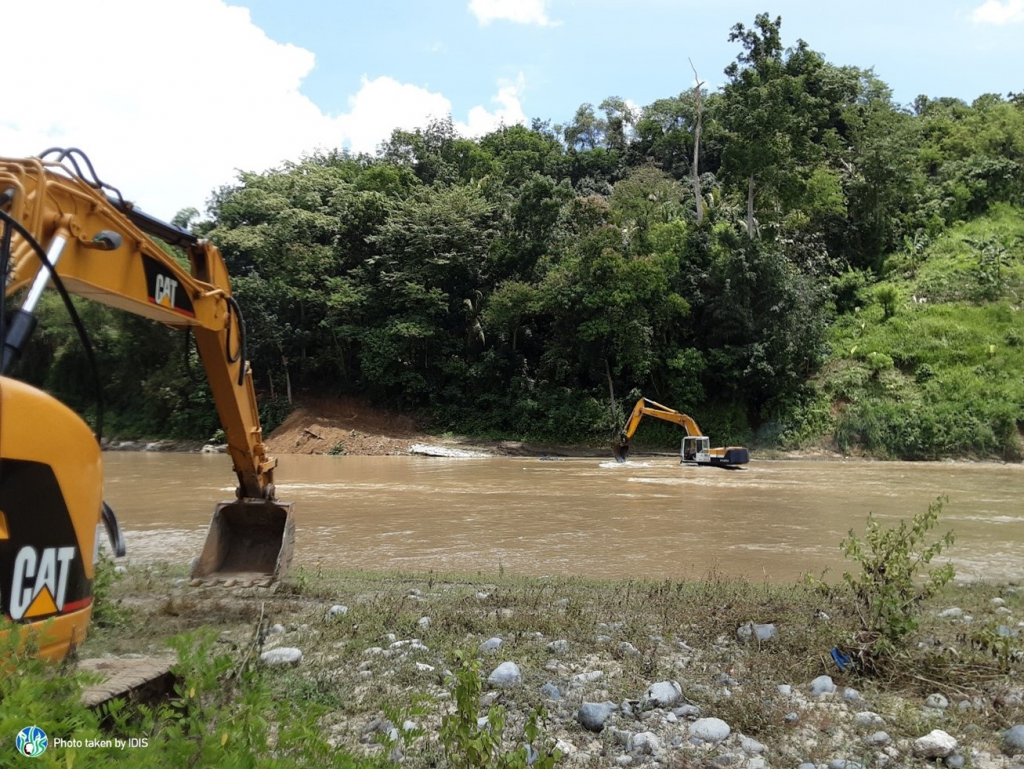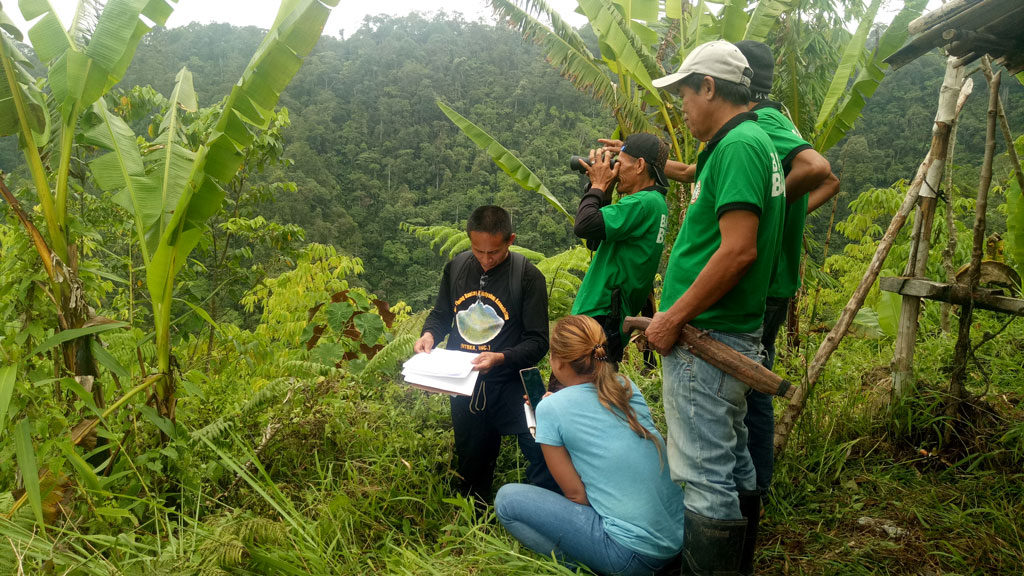IDIS Conducts Interfacing with National and Local Government Agencies on Non-Mettalic Mining in Davao Region

Since 2011, IDIS has been spearheading the conduct of interfacing with the Department of Environment and Natural Resources and line bureaus together with other national and local government agencies to discuss environmental issues and concerns. On this year’s interfacing, IDIS has again partnered with the Department of Environment and Natural Resources XI and City Environment and Natural Resources Office and discussed Non-Metallic Mining in Davao City last October 29, 2020. The interfacing was participated by the Mines and Geoscience Bureau XI, Environmental Management Bureau XI, Davao City ENRO – ADD other organizations and office participated. Basalt, sand and gravel, limestone, and volcanic tuff are among the most common non-metallic minerals in Davao City according to Department of Environment and Natural Resources XI Mining Claims Examiner, Engr. Ronald Villanueva. In his discussion regarding Mining Engineering and Technical Guidelines and Mitigation Measures, he addressed the implications of mining, how quarrying should only be permissible with a permit, and what sample parameters and guidelines are to be considered in mining. Since mining is a pervasive and polarizing issue, DENR believes that it can lead to irreversible consequences and destruction. Thus, he reiterates the importance of conservation management, development, and proper use of the state’s mineral resources including reservations, watersheds, and lands of the public domain. Since 2018, there have been an increasing number of sand and gravel applications in different areas in Davao City where it is prohibited. Thus, there is also a growing concern for the environmental impacts of Sand and Gravel in the region. EnP. Lemuel Lloyd Manalo, IDIS Environmental Research Specialist discussed the harmful implications such as the flawed policies of its processes as well as extractive practices in the area. In the study, he surmised the need to regulate the city’s growing practices through the development of maps as well as imposing its need for local zoning ordinances to prevent the further degradation of these lands. Discussing the updates in non-metallic mining in Davao City, Engr. Melody Dapusala of CENRO stated that in the past three years, there have been issuances and stifling of operations in quarrying in various parts of Davao City. Through their quarrying monitoring team, they have issued a notice of violations as well as cease and desist orders in various districts in the City. Through these efforts, they have helped the City in regulating the issuance of approved quarry permits in the region. At the end of the session, several youth organizations, government agencies, and representatives from the civil society discussed issues on the implementation of regulated non-metallic mining in the city. All of which aspires to achieve a common purpose, a consensus in protecting the environment’s resources, to better not only the Davaoenos living standards as well as the entire country.
IDIS, Partners Discuss Plantations and Aerial Spray Issues

The Interfacing Development Interventions for Sustainability (IDIS) together with the Fertilizers and Pesticides Authority, Sustainable Integrated Area Development Initiatives in Mindanao-Convergence for Asset Reform and Regional Development (SIMCARRD), Offices of Councilor Maria Belen Acosta and Councilor Ralph Abella, and officials of Barangay Sirib and Lacson, discussed issues and concerns on plantations and the revival of the Aerial Spraying Regulation in Davao City last October 23, 2020. The round table discussion tackled various issues concerning the operations of agri-business monocrop plantations like banana and pineapple and the resumption of aerial spraying practice in other barangays in Davao City. IDIS through Atty. Mark Peñalver discussed the highlights of the Supreme Court decision declaring the Ban Aerial Spray Ordinance of Davao City unconstitutional in 2016. EnP Lemuel Manalo also presented the highlights and policy recommendations of the study – Mapping of Banana Plantations in South-Central Mindanao conducted in 2019. FPA XI shared that there is a memo released mandating the use of drone for aerial spraying which will somehow manage impact and minimize pesticides drift but plantation companies are yet to adopt it because of the cost efficiency concern. The participants also discussed the strict and full implementation of buffer zones in plantations. The existing local and national laws require plantations to implement buffer zones in between plantations and other land uses such as residential, institutional and protected areas. Highlights of agreed action points include promotion of anti-aerial spray policy in affected local communities or barangays and lobby the same to their respective cities/municipalities. Further, the revival of Multi-partite Monitoring Team (MMT) in plantations was also emphasized. The FPA suggested that the Barangay Officials will be deputized as local MMT, strengthen self-monitoring of plantations, and include the City Agriculture Office to monitor good and negative plantation practices. For this to be fast tracked, and Executive Order to be issued by the City Mayor was identified as a possible option. Chinkie Pelino-Golle, IDIS Executive Director, advised the barangay officials present to check their barangay health centers records with regard to the possible effects of pesticides and aerial spray to the health of their constituents. Barangay Officials were also urged to lead in drafting their own regulative resolutions and ordinances especially on the plantations risk management measures, land-use management and crop conversion regulations, exact corporate social responsibility from plantation companies operating in their respective barangays, come-up with list of incentives and benefits on both plantations and barangay, and mandate plantation companies to ensure proper installation of road and drainage systems. Finally, the Office of Councilor Ralph Abella, which is also the Chair of the Committee on Agriculture of the Davao City Council, committed to sponsor the passage of a policy that will address the issues and concerns on plantations in Davao City in accordance with the existing Organic Agriculture Ordinance, Watershed Code, and other related local and national policies.
No to Reclassification of Agricultural Lands and Water Zones
IDIS, along with other CSOs, participated in the series of workshops for the updating of Davao City’s Land Use Plan The City Government of Davao’s land use plan is focused on decongesting the city’s urban center. While this is a welcome development, the City should ensure that environmental critical areas and green zones outside the current urban district remain protected and will not be compromised in the development process. Davao has decided to retain among its top priorities food security and ecological protection by maintaining 60% of the city’s land area to be devoted for agriculture. To achieve this shared goal, these two should be non-negotiable for reclassification: Agricultural to non-agricultural conversion As the City gears towards continued development, high premium must be placed on our agricultural lands. They shall be protected by all means necessary, to ensure food supply and food security for Dabawenyos. The City through the Comprehensive Land Use Plan and Zoning Ordinance should restrict land conversions especially agricultural areas to non-agricultural. One concrete example would be the existing Gaisano Grand Mall in Calinan. The building has affected farmlands which could have yielded the city a more economically beneficial if its original use to ensure rice and food supply was retained. We further recommend that the City should: Map productive and non-productive agricultural areas in Davao City and strictly prohibit reclassification of productive agricultural areas. For non-productive areas, a recommendation for its reclassification can only be made if there is proof for a need to reclassify the same. Aspire to increase the production of food crops such as rice for local consumption; Identify more areas to be declared as organic agricultural (OA) zones, provide appropriate support for organic farmers to increase production and market opportunities, and establish more buffer zones in these zones to protect them from contamination; and Due to the rise of demand of reclassification appeals from homeowners’ associations applying for socialized housing, encourage settlement build up only in existing Rural Settlement Zones (RSZ) to protect prime agricultural areas to be reclassified. The government should survey lands/prepare clustered areas for socialized housing and relocation, rather than scattered separate sites. Water resources zone to other allowable uses Water Resource Zones are crucial for Davao’s sustainable water supply. These are areas on top of identified locations of principal source of drinking water where Davao City Water District has existing or planned production wells within 350-meters buffer zone. Granting of additional allowable use is prohibited in these zones so applications for allowable use within/near these zones should never be approved nor entertained in the first place. Sadly, there have been applications that were approved including those projects in high density residential zones. Thus, we recommend that: The definition of a Water resource Zone should not be limited to DCWD-covered areas with existing, planned or proposed production wells but should be expanded to include other areas which may have water resources; The 350-meter buffer area provision be increased/stretched since this current figure is insufficient to prevent damage/harm to water resources; and The Local Zoning Board of Adjustment and Appeals should refrain from recommending to the City Council applications for additional allowable use which are clearly within or near a water resource zone Download our full position paper on the CLUP and Zoning Ordinance here.
Bantay Bukid Report for 1st Quarter 2019

To start the year, 71 Bantay Bukid volunteers conducted biodiversity monitoring, with an increase in the number of species recorded compared to last quarter’s patrol. They planted over 800 seedlings in our riverbanks and monitored previously planted areas to replace seedling mortality due to El Niño. They also continued protecting our river waters from waste pollution, collecting up to 110 kilos of garbage from 4 clean-up drives. Our volunteers likewise committed to help in the monitoring of the reported Tabak – Kalatong illegal entry, occupation and poaching in the ancestral domain of the Obu-Manuvu in Brgy. Carmen. Enforcement on Environmental Laws – one incident of illegal fishing violating the City’s Watershed Code reported in March documented Biodiversity Monitoring and Reforestation – Trek to Mt. Tipolog last March 2019 showed sixty six (66) species of trees and plants, forty (40) species of mammals, five (5) species of birds, one (1) species of amphibians identified using their local terms. River Monitoring – Amount of garbage collected in riverbanks more than doubled with 110 kilos compared to last year’s 43 kilos. The water quality in Panigan-Tamugan river remains to be of high quality Class A based on the community-based water monitoring measuring basic parameters. Organizational activities and Community Action – 7 Organizational Activities, 8 LGU/Community Activities, 4 Participation to CSO events including bayanihan to clear trails for students/farmers and help in securing water for community, participation to BLGU flag ceremonies for watershed reporting/updating, planning for Davao City integrated watershed management and zero waste month celebration. For government action: Establishment of materials recovery facility and garbage collection points Strict implementation and monitoring of Solid Waste Management and other ordinances in watershed areas Kalatong-Tabak tree poaching and illegal entry Read the full report.
